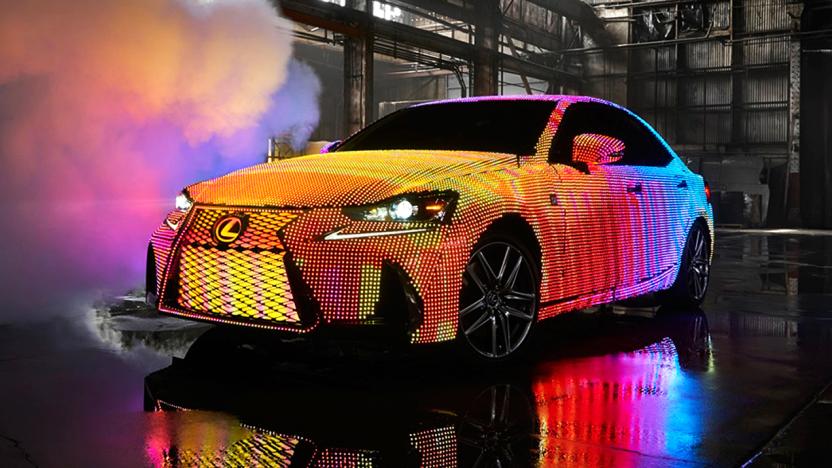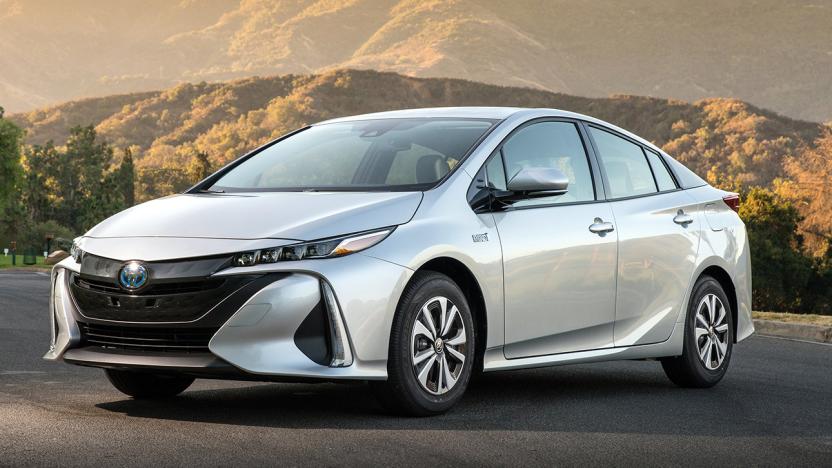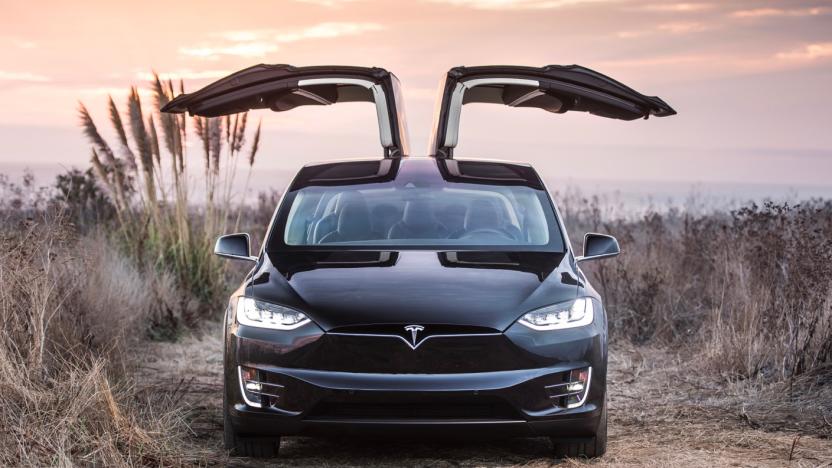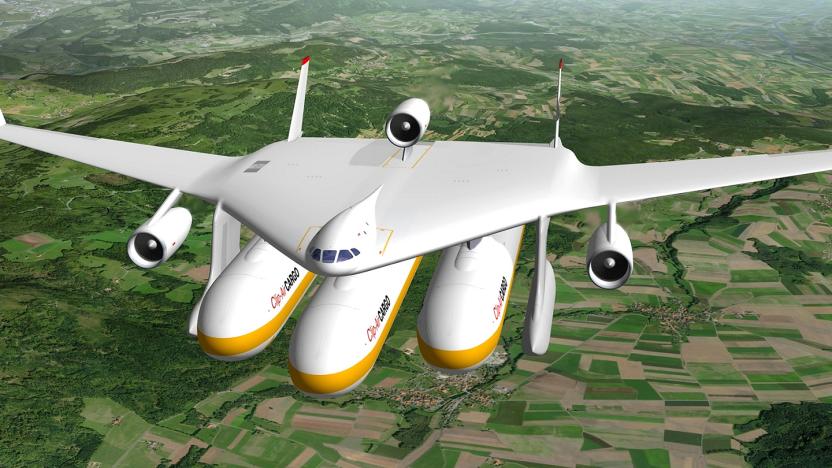weekingreen
Latest

Panasonic's indoor farm, and more in the week that was
Tesla's groundbreaking affordable electric car is nearly here. This week the automaker announced plans to begin production on the Model 3 by the end of the month. Meanwhile, environmental champion Leonardo DiCaprio just signed up as the official ambassador for BYD's new line of EVs. Georgia broke ground on a road paved with 18 miles of solar panels, and the tiny TigerMoth camper is an off-grid shelter that generates power while it's being towed.

Hummingbird-inspired wind turbines, and more in the week that was
It's official: New York just gave the green light to build the largest offshore wind farm in US history. The project will be located 30 miles southeast of Montauk, and it will produce enough energy to power 50,000 homes. Meanwhile, researchers have developed a revolutionary new wind turbine that trades spinning blades for flapping wings reminiscent of a hummingbird. Dubai kicked off phase three of the world's largest solar park. When it's complete it will produce a whopping 800 megawatts of clean energy. Speaking of the sort, Elon Musk is a champion of clean energy -- so imagine our surprise when Musk threw his support behind former ExxonMobil CEO Rex Tillerson as Secretary of State. And Ireland just voted to become the world's first country to fully divest from fossil fuels.

Tesla's new Roadster, and more in the week that was
Has Tesla succeeded in creating a vehicle that reacts faster than its driver? A recently-surfaced dashcam video appears to show Tesla's autopilot mode predicting an accident moments before it actually happens. It currently takes hours to charge an electric car - but Elon Musk just hinted that Tesla's next-gen superchargers will be able to juice up an eve in mere seconds. Musk also confirmed plans for a new Tesla Roadster, which is expected to debut in 2019. Uber recently launched a fleet of self-driving cars in California, but the state promptly shut the experiment down. Uber won't have to look far for a new testing grounds, though - Nevada is welcoming the company's self-driving taxis.

Apple's new solar-powered campus, and more in the week that was
As the founder of Tesla, Elon Musk is a proponent of clean technology and renewable energy. That's why it's so surprising that Donald Trump has selected Musk to serve as a strategic advisor -- here's hoping Musk can convince the President-elect to take climate change seriously. In other news, Chevrolet just delivered its first batch of Bolt EVs to customers in the San Francisco Bay Area, beating Tesla's Model 3 to the punch. Steven Hawking is working with NASA to launch a self-healing starship that will search for habitable planets in Alpha Centauri. And Japan Airlines has developed a way to transform old clothing into jet fuel.

Lexus' insane LED-covered car, and more in the week that was
Transportation startup Lucid Motors is working on an electric car to rival the Tesla Model S, and it just announced plans to build a $700 million manufacturing facility to bring it to fruition. Meanwhile, Lexus unveiled a mind-blowing car covered with 41,999 LEDs that can change colors at a whim. Could the solution to congested streets lie in subterranean tunnels? That's the idea behind these crazy CarTubes, which could move city traffic underground. Four major cities around the world pledged to ban diesel cars by the year 2025, and UPS just rolled out its very first e-bike delivery vehicle in Portland, Oregon.

The world's fastest electric car, and more in the week that was
Tesla finally sealed the deal on its acquisition of SolarCity this week, and the merger is already producing incredible results. The two companies just completed a project to power an entire island on solar power. In other energy news, researchers in Israel developed found a way to make solar panels 70 percent more efficient. Two Chinese companies are building a massive solar plant in the exclusion zone near the Chernobyl nuclear reactor. And Sweden announced plans to cut its tax on solar energy by 98 percent.

A new supersonic jet, and more in the week that was
Tesla currently makes the world's best electric vehicles, but Jaguar's first EV could give the automaker a run for its money. Meet the I-Pace: a svelte, stylish electric SUV that's faster than most sports cars and can drive 220 miles on a single charge. In other auto news, a new law requires all electric vehicles to make noise by the year 2019, and VW's new e-Golf can drive further than the Nissan Leaf at 124 miles per charge. Long-haul flights are the worst, but a new supersonic jet called the Boom could cut them in half. And Noordung launched a stylish vintage-inspired e-bike with a built-in sound system.

Fisker's EMotion sports car, and more in the week that was
Tesla swept headlines this week by launching a groundbreaking solar roof tile that's better looking and longer lasting than standard shingles. The technology could trickle down to the company's cars too -- Elon Musk hinted that the upcoming Tesla Model 3 could feature a solar roof that melts ice and snow while generating energy from the sun. Meanwhile, legendary automotive designer Henrik Fisker finally unveiled his EMotion sports car, which will be able to drive 400 miles on a single charge when it launches next year. Nissan debuted the first all-electric mobile office, which is housed in a beautifully renovated e-nv200 van. And a Chinese company is getting ready to launch the world's fastest maglev train, which will be able to hit 373 miles per hour.

A real-world Hyperloop preview, and more in the week that was
The Hyperloop cometh: Danish architecture firm BIG just gave the world a sneak peek at a 93-mile track designed to connect Abu Dhabi and Dubai, while the University of Waterloo is set to test the world's first levitating pneumatic system next week. Tesla is having a great month as it turned a profit for the first time in two years and unveiled its next-generation Powerwall 2.0 system. Meanwhile, Henrik Fisker gave the world a first look at his upcoming 'Tesla-killer" supercar, which is set to launch next year. And Otto delivered the world's first shipment by a self-driving truck: 51,744 cans of Budweiser beer.

Tesla's self-driving future, and more in the week that was
Tesla is making several big announcements this month, and Elon Musk just delivered the first: From now on, all new Tesla cars will be self-driving. The electric automaker also teamed up with Panasonic to build solar panels for its Powerwall home battery, which it's set to update next week. Hyperloop One is forging ahead on its futuristic transportation system by raising $50 million and hiring Uber's former CFO as an advisor. It looks like Apple has scrapped plans to build a self-driving car, and BMW showcased plans for a next-gen smart motorcycle that will never crash or tip over.

The Prius Prime's efficiency, and more in the week that was
What does Tesla have up its sleeve? The automaker is planning to unveil a mysterious new product on Monday, and speculation so far ranges from the finalized Model 3 to a major Autopilot update. Meanwhile, the Toyota Prius Prime received a spectacular 133 MPGe rating, making it the most efficient electrified vehicle you can buy in the US. A new European law could require all new homes to install electric vehicle chargers. And Vello launched the world's first folding electric bike that can power itself.

Amsterdam's autonomous canal boats, and more in the week that was
Hydrogen-powered cars and planes are on the rise, and this week Germany announced plans to launch the world's first completely hydrogen-powered passenger train in 2017. In other transportation news, Volvo unveiled a new SuperTruck that's 70 percent more fuel-efficient than big rigs on the road today. The world's first solar-powered helicopter lifted off on its maiden flight in Maryland. And Amsterdam is getting set to launch a fleet of autonomous boats in its famed canals.

A 3D-printed autonomous car, and more in the week that was
3D printing and autonomous cars are two of today's hottest emerging technologies -- so why not combine the two? That's the idea behind Local Motors' latest vehicle, which features a 3D-printed body, a windshield video screen and no steering wheel. Meanwhile, OX launched the world's first all-terrain flat-pack truck, which can be quickly shipped anywhere in the world. Cannae Corporation announced plans to test an "impossible" zero-exhaust microwave thruster that could revolutionize space travel. And Electra Meccanica launched SOLO, an affordable three-wheeled electric vehicle for one.

Self-driving taxis and buses, and more in the week that was
The age of the self-driving car is finally here: Uber just announced plans to launch its first fleet of autonomous taxis this month, and self-driving buses are now hitting the streets of Helsinki. Airbus is shooting even higher with plans to build an autonomous flying taxi by the year 2017. Meanwhile, Nissan debuted a solid-oxide fuel-cell vehicle, which runs on ethanol and water instead of hydrogen. And Bosch rolled out a world's most compact folding electric bike, which packs down small enough to fit easily in a car trunk.

Karma's stunning electric supercar, and more in the week that was
After years of anticipation, Karma Automotive has finally unveiled the Revero, a plug-in electric supercar powered by roof-mounted solar panels. In other transportation news, BMW launched an electrified version of its flagship sedan, and a new report shows that the UK will have more EV chargers than gas stations by the year 2020. Work continues on the Hyperloop: One company announced plans this week to build the world's first underwater supersonic transport tubes. And Republic Bike's kids cargo bike might just be the coolest ride for pint-sized commuters.

A bus suspended over the ground, and more in the week that was
So far Tesla has launched a sexy sportscar, a luxe sedan, a powerful SUV, and an affordable electric car. What's next? Think bigger. According to Elon Musk, the company is set to unveil an electric Minibus next year, and it will drive itself. Speaking of buses, China just unveiled the craziest one we've ever seen: It's suspended above the ground, and is tall enough to fly right over traffic jams. A team of students created the world's most efficient electric car, which gets an outrageous 26,135 MPGe. Gogoro launched a new electric scooter sharing service in Berlin, and the world's first Hyperloop factory opened for business.

Nissan's gold Olympics-edition EV, and more in the week that was
Tesla's Gigafactory is set to double the world's battery production, and this week it opened its doors for the first time. Tesla is also working on an electric truck, but Mercedes-Benz beat them to punch this week by launching the world's first all-electric big rig. In other transportation news, a sun-powered airplane completed an epic trip around the world -- and we highlighted eight milestones from its record-shattering flight. Nissan announced that it will give golden Leaf EVs to medal-winning Olympic athletes. And Norway unveiled plans to build the world's first floating underwater traffic tunnels, which will be suspended from pontoons.

Tesla's plan for world domination, and more in the week that was
Tesla is known for producing some of the world's best electric cars, but founder Elon Musk has even bigger plans for the company: world domination. Musk's new masterplan will grow the company to produce trucks and buses while using battery technology and solar infrastructure to transition the world away from fossil fuels. Meanwhile, the world's first "Tesla Town" is coming to Australia, and every home in it will feature solar panels and a powerwall. Driverless cars are almost here: This week Mercedes-Benz unveiled the fully autonomous bus of the future, while a GM exec confirmed plans to launch a self-driving Chevy Bolt EV with Lyft. And we spotted a crazy truck that's able to lay its own road across treacherous terrain in just six minutes.

Inhabitat's Week in Green: A modular airplane, and more!
Is the age of the solar-powered car upon us? Hanergy thinks so. The Chinese company just debuted four new vehicles that source all of their energy from the sun. Meanwhile, Clip-Air announced plans to test a crazy modular airplane that carries passengers and cargo in detachable pods. Eleven electric cars set off on a 15,534-mile race across 20 countries and three continents. And cycling infrastructure made huge strides as Paris launched its first bicycle superhighway and the US made progress on a colossal bike path connecting the entire East Coast.

Inhabitat's Week in Green: Solar roadways, and more!
Photovoltaic roads sound almost like science fiction, but they're becoming reality in the US. This week Missouri announced plans to pave a section of the historic Route 66 with energy-generating Solar Roadways tiles. In other futuristic transportation news, Russia wants to build a 44-mile-long hyperloop track that stretches along the coast to China. Driverless cars are expected to hit prime time within the next five years, and we explored whether the convenience they offer will fuel suburban sprawl. Volkswagen promised to pay a whopping $14.7 billion to owners of cars affected by the emissions cheating scandal. And if you hate parallel parking, check out these incredible omnidirectional wheels that allow any car to drive sideways.
